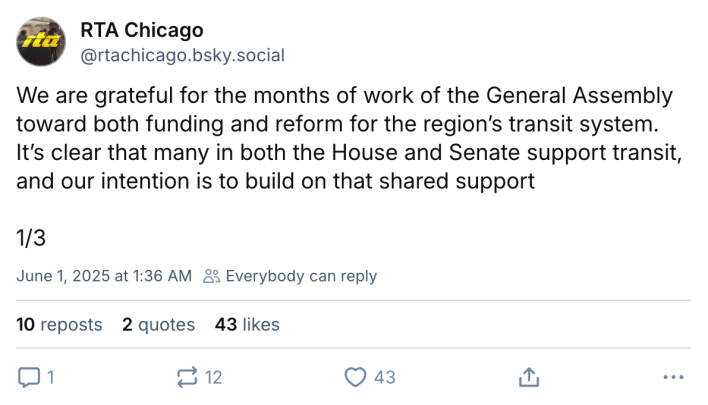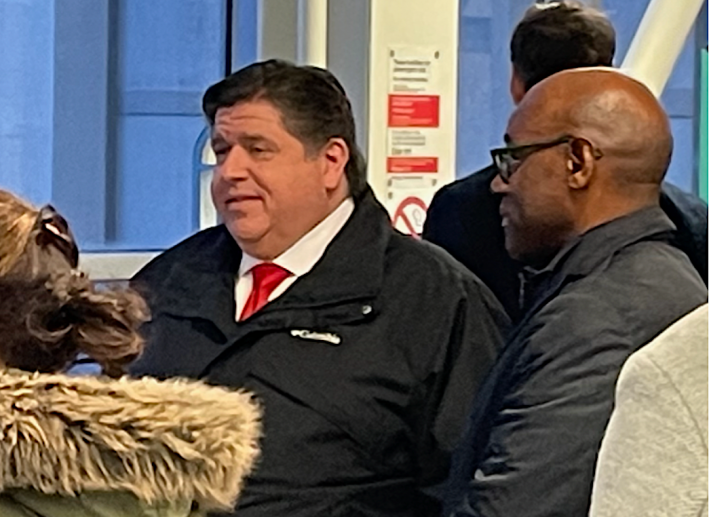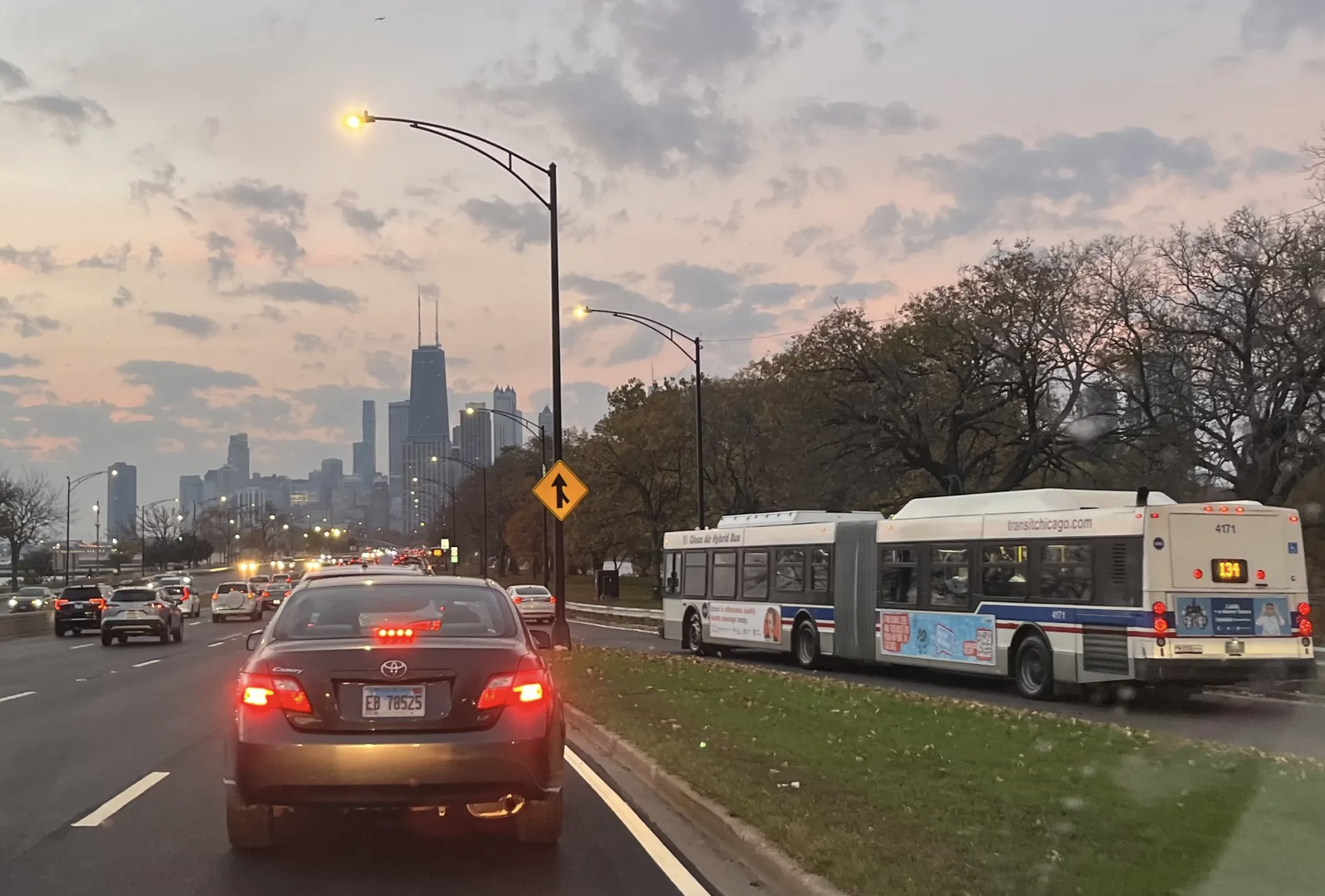
Good morning Streetsblog Chicago readers. I hope that as you read this, you've got a cup of strong coffee, or whatever your favorite morning beverage is, while we face the sobering outcome of Saturday's late-night Illinois General Assembly session.
If you've looked at our Bluesky or Twitter accounts recently, you know that the news about efforts to avert the Chicagoland transit fiscal cliff ain't good. But here's a summary to make sure all of our readers are in the loop, even if they're not in the Loop or Springfield.
As Streetsblog followers know, stakes were high last night. According to the Regional Transportation Authority, which oversees the CTA, Metra, and Pace, our region is facing a $771 total million transit budget gap in 2026, when federal COVID-19 stimulus funds will run out.
If lawmakers didn't plug that hole, or ideally allocate $1.5 billion to upgrade the Chicago area's public transportation system, the outcome would be bleak. It was was projected that next year we could see about 40 percent less bus and train service, and some 3,000 transit workers lose their jobs.
The legislators had a deadline of roughly midnight, after which hopes of properly funding buses and trains would turn into a pumpkin. In that case, the problem wouldn't be addressed again until the veto session in October or November. But that would probably be too late for the transit agencies to avoid scheduling likely irreversible service cuts and layoffs for next year.
Late Wednesday night, the existing bill HB3438 was amended to add new funding sources to the House's version of the legislation to swap the RTA with a new Northern Illinois Transit Authority. Additional revenue would come from new taxes, such a proposed 10 percent for Uber and Lyft rides in our region.

Unfortunately, things didn't go as we wanted last night. Last night SBC cofounder Steven Vance was closely tracking what was going on in the Illinois House and Senate. The situation seemed hopeful when Steven texted me just after the clock struck twelve. "The Senate passed the transit bill, HB3438," he wrote. "The House had not discussed it, but their floor debate is still happening on other bills."
However, at 1:30 a.m. (yes, we're night owls), Steven wrote, "It appears the House adjourned without debating and without voting on transit." So did that mean that hopes for heading off draconian Chicagoland transit cuts were dashed? (I used slightly less flowery language.) "It means that the transit bill cannot be taken up again without veto sessions," he replied.
He then astutely consulted the RTA Bluesky feed, probably one of the more reliable source for facts about what happened. A short thread posted by spokesperson Tina Fassett Smith, posted minutes after Steven's and my last exchange, seemed to confirm my fears.
The posts started with a gracious thank-you note to lawmakers. "We are grateful for the months of work of the General Assembly toward both funding and reform for the region’s transit system," Fassett Smith wrote. "It’s clear that many in both the House and Senate support transit, and our intention is to build on that shared support to identify the funding needed to avoid devastating cuts and disruption for everyone in Northeast Illinois."

But things went downhill from there. "Balancing regional interests is challenging, but we are ready to continue our work to achieve consensus and deliver a solution," the RTA spokesperson continued. "In the coming weeks the RTA will work with the [CTA, Metra, and Pace] on a regional budget that by law must only include funding we are confident the system will receive in 2026."
Steven explained the bad news in a Streetsblog Bluesky post. "The Illinois House did not take up the debate or vote for HB3438, and adjourned until veto session," he wrote. "Transit reform and revenues is not adopted. RTA confirms that transit budgets for 2026 will need to reflect expected revenues, which has a deficit of about $771 million."
Streetsblog readers know the drill. That massive public transportation funding cut would much less frequent and reliable transit service and likely fare hikes, which means less ridership and even less revenue, aka the dreaded "transit death spiral." And that in turn would mean way more driving, crashes, pollution, and congestion, and make the region far less equitable. Instead of the hoped-for $1.5 billion-funded transit utopia, we're facing a Chicagoland transportation dystopia.

However, I'm trying to not lose all hope. Governor JB Pritzker chose to make relatively few public statements about the transit funding debate. But it certainly won't help his reported presidential ambitions if he's got crumbling Illinois public transportation on his resume. So maybe something unexpected will happen – I've got my fingers crossed.
Update 6/1/25, 2 PM: Read the report from CapitalFax, probably the best source for state budget news, on Pritzker's press conference about the budget this morning. We've highlighted the portions about transit on Bluesky and Twitter.

Did you appreciate this post? Streetsblog Chicago is currently fundraising to help cover our 2025-26 budget. If you appreciate our reporting and advocacy on local sustainable transportation issues, please consider making a tax-deductible donation here. Thank you.






